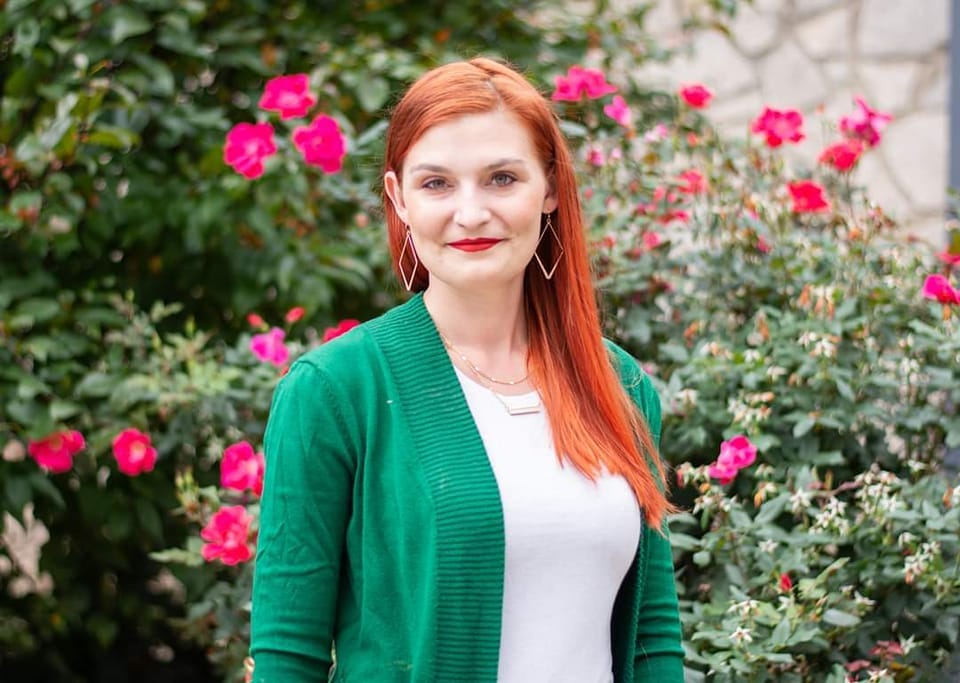Unstoppable: How Megan Flahart-Smith Has Redefined Success While Navigating Society With Bipolar Disorder

Knowing a plan for action if that person begins experiencing a mental health crisis can save a life, so encourage them to create a plan and put it somewhere easy to access.
As a part of our “Unstoppable” series, I had the pleasure of interviewing Megan Flahart-Smith.
Megan Flahart-Smith is a successful social media marketing specialist and mom of three. She has battled Bipolar I Disorder all her life, but wasn’t officially diagnosed until age 25. During the years preceding diagnosis, Megan endured traumas in abusive relationships, which she thought was the reason behind her mental health. After receiving the diagnosis things got worse before they got better, as she at point was on 16 pills per day- just for her mental health. The pregnancy of her third child gave her a chance to reset and now Megan has been in remission from this debilitating mental illness with the help of just one pill per day and a lifestyle overhaul. She’s ready to now share how she gained control over something that once devoured her life.
Thank you so much for doing this with us! It is really an honor. Our readers would love to get to know you a bit better. Can you share your “backstory” with us?
Thank you so much, the honor really is mine! So a little about my backstory. I’ve struggled with my mental health my entire life. I went through countless therapists, antidepressants, even was hospitalized in a psychiatric facility twice and went through two rounds of intensive outpatient therapy where I went through some pretty intense therapy and spent hours at a time there so they could educate me on how to improve my life. I’m honestly not ashamed of it because it gave me some great tools to ensure I’m on track, which I still use to this day. I wasn’t diagnosed with Bipolar I Disorder until age 25, which was a relief to finally know what was happening, but also began 3 years of pure hell to get me onto the correct medications.
Do you feel comfortable sharing with us the story surrounding how you became disabled or became ill? What mental shift did you make to not let that “stop you”?
I originally thought my illness, which manifested first as intense depression, was due to terribly abusive relationships I had endured. But with each new medication they tried, it would push me into such a “high point” that I felt like there had to be more to it than this. So my voracious appetite for research led me to discover that what was really going on was in fact Bipolar I disorder. My psychiatrist confirmed that in 2013.
I kind of wallowed in that diagnosis for a while, felt like it was my new identity and that I just had to accept that I was now the “crazy girl”. After I got pregnant with my third child, my daughter Olivia, I recognized there was way more to life than this. So I started searching for ways to dominate this disease instead of being swallowed by it.
Can you tell our readers about the accomplishments you have been able to make despite your diagnosis ?
Even before my diagnosis, I was very bullheaded. If someone told me I couldn’t do something, I made a point to prove them wrong. So in 2010 I graduated from Phlebotomy school, which I discovered about three years later that I did not want to do for the rest of my life.
After my diagnosis, I put myself through college. My husband helped take care of the financial side of things and in 18 months I earned my Associate’s Degree in Paralegal studies while also taking care of my three kids, including my daughter who was born prematurely and spent time in the NICU.
Since then, I taught myself everything I could possibly learn about social media and created MFS Digital Marketing, my newest baby which even in its infancy is already highly successful. I gain more and more confidence with each new client and I really appreciate every single day being stable enough to make this happen.
What advice would you give to other people who have disabilities or limitations?
Whatever you do, do NOT let it define you. You may have a disability or a terrible circumstance, but it is not your entire identity. If anyone, including your doctors, tells you something you don’t feel is right do your own research. Educate yourself, never stop educating yourself. And be willing to take a good hard look at your life and what you may be able to change to improve everything! Look at how much you sleep, what stressors you have, how you eat, any substances you may use including nicotine or alcohol. Really evaluate everything and be open to trying new things.
None of us are able to achieve success without some help along the way. Is there a particular person who you are grateful towards who helped get you to where you are?
Well they say it takes a village, and I believe that even after childhood it still does. My parents have been a huge support. My husband of 10 years has been there through all the ups and downs and has really started to work on changing his life too so that we can both really benefit from all the work I’ve put in. I also have some pretty incredible clients that have helped me to stay accountable and an awesome business coach who has helped me to shed all the things in my past that were holding me back.
How have you used your success to bring goodness to the world?
I believe in inclusivity and that mental health is the number one most important aspect of health because it can legitimately effect everything else. I advocate for mental health often and have plans to work more with this as I gain more means to do so.
Can you share “5 things I wish people understood or knew about people with physical limitations” and why.
5 things I wish people understood or knew about people with physical or MENTAL limitations is this:
- Compassion for what that individual may have to endure on a daily basis goes a long way.
- Understanding the person’s background can help you to know exactly how to help make their life a little less difficult.
- Medications are sometimes necessary, and that doesn’t make that person weak or like they are taking the easy way out. It sometimes takes a lot of strength to get the help they need.
- Men struggle with mental health issues just like women and again, them getting help actually makes them really strong and not weak.
- Knowing a plan for action if that person begins experiencing a mental health crisis can save a life, so encourage them to create a plan and put it somewhere easy to access.
Can you please give us your favorite “Life Lesson Quote”?
“Do it scared.” Everything in life can be scary, but if we just face that fear and push through it we will absolutely thank ourselves later.
We are very blessed that some of the biggest names in Business, VC funding, Sports, and Entertainment read this column. Is there a person in the world, or in the US whom you would love to have a private breakfast or lunch with, and why? He or she might just see this 🙂
I think I’d love to have breakfast or lunch with Dr. Daniel Amen. I think his insight on how to combat the stigma of mental health and to treat it just like any other part of the body is something I’ve thought about for years and I’d love to hear more of his insight on that.
This was very meaningful, thank you so much. We wish you only continued success on your great work!
Unstoppable: How Megan Flahart-Smith Has Redefined Success While Navigating Society With Bipolar… was originally published in Authority Magazine on Medium, where people are continuing the conversation by highlighting and responding to this story.
